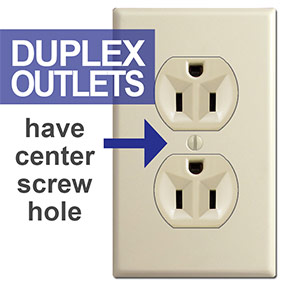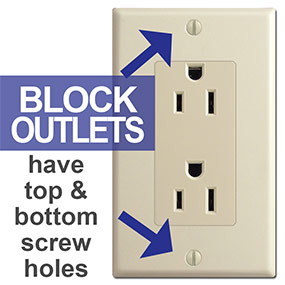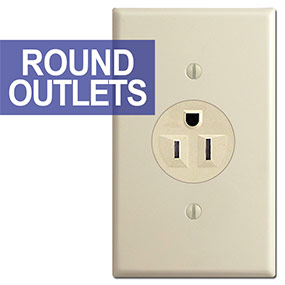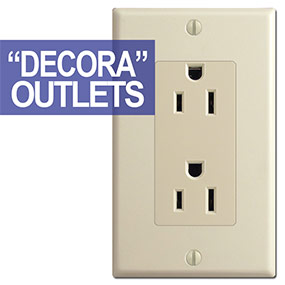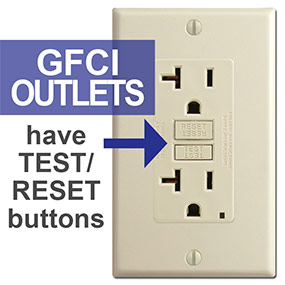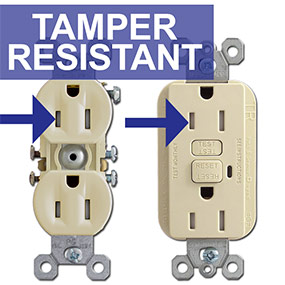Compare electrical outlet types to find the right size wall plug or socket for your home or business. Choose from 15A, 20A, TL (locking), GFCI, AFCI, 120V, 240V, round, or square receptacles depending upon need, style, and current safety considerations.
Basic Outlet Types
Duplex outlets have a center screw hole.
The correct plate is a duplex cover.
This has been the standard outlet found in U.S. homes for quite some time.
Each outlet in a duplex receptacle has a long (neutral) slot (seen on the right side of each plug), a shorter (hot) slot (shown on the left), and a half-round grounding hole (at the top of each outlet).
Block outlets have screw holes above and below the device.
The correct cover is a rocker switch plate.
Single round outlets have room for just 1 plug and sit in a round opening single receptacle cover plate.
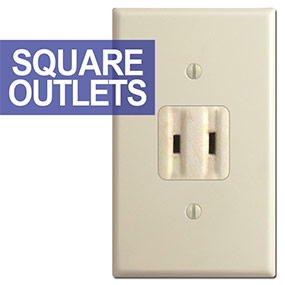
In some very old homes, you may find a vintage square outlet like this one.
Types of Block Outlets
Modern outlets are rectangle shaped devices which fit rocker cover plates.
They are often referred to as block outlets, decorator outlets, or "Decora" receptacles.
The term "Decora" is a trakemark of Leviton, although it's often used interchangeably with the term "rocker" to refer to this larger rectangular switch plate opening.
GFCI stands for ground fault circuit interrupter. This type of receptacle reduced the risk of electric shock by shutting off power if it detects that the electrical current is traveling through any abnormal path to ground (such as through water or a person).
It works by monitoring the amount of current flowing from hot to neutral. If a GFCI detects any imbalance, it trips the circuit, cutting power to the outlet
GFCI outlets feature test and reset buttons in the center. They are required in bathrooms, near faucets in kitchens, and outdoors.
The correct cover is a rocker switch plate.
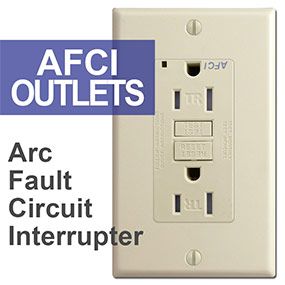
AFCI (Arc Fault Circuit Interrupter) protect against potential electrical fires by detecting arcing in wiring and at receptacles.
When electrical wires get damaged (such an alarm clock's cord getting pinched between the furniture and the wall), the current will have to arc across a gap in the wire to complete the circuit.
This is the main cause of electrical fires in homes.
AFCI receptacles are designed to detect arcing and cut the power if detected.
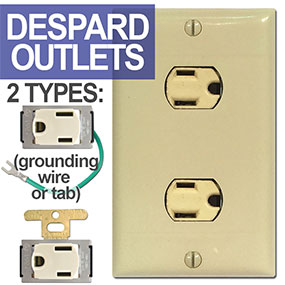
Despard outlets fit covers with smaller despard openings.
These outlets may have either a grounding wire or a grounding tab.
Receptacle Amperage
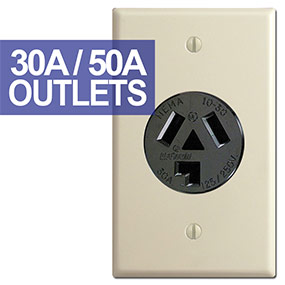
30A and 50A receptacles are used to power large appliances in the home.
These receptacles are for dryers in laundry rooms, cooking ranges in kitchens, and large power tools used in a home's garage.
Tamper Resistant Outlets
Tamper resistant outlets were created for child safety.
You can see by looking at these receptacles that inside the slots there is a shutter mechanism in place to block access unless a 2-prong plug is inserted.
Tamper resistant (TR) receptacles help proect children by ensuring items such as bobby pins or keys can't be inserted.

